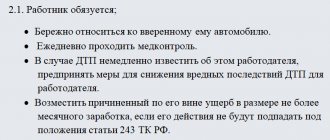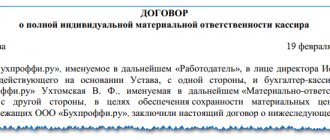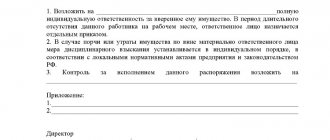Business lawyer > Accounting > Primary documents > Sample contract for financial liability of a cashier-seller, how to protect yourself
Retail chains are developing, the number of self-service stores is growing every day, and the profession of salesperson-cashier is becoming one of the most in demand. How to ensure the safety of cash and preserve your property, what a sample cashier-seller liability agreement should contain, as well as what actions you need to take to compensate for the loss of property from your employee, you can learn from this article.
Professional responsibilities of the employee
A cashier-salesperson is a universal specialist, as he deals not only with cash and valuables, but also with people and equipment.
The cashier seller is obliged to:
- Serve customers in the cash register.
- Work with cash documents, cash, reconcile cash payments and the actual availability of funds, conduct an inventory, hand over funds for collection.
- Understand not only financial issues, but also be able to identify a technical malfunction of a cash register (hereinafter referred to as the cash register), and also correct it if possible.
- Monitor price tags on goods from the sales floor with database data in the cash register, be able to advise the buyer, and be a conduit between the store administration and its client.
The range of responsibilities is very wide and requires the employee not only to have knowledge and skills, but also to guarantee the employer that all the valuables with which the specialist will work will remain intact. Below we will look at a document that allows you to protect the employer from losses intentionally caused by the employee.
Agreement on full financial responsibility of the cashier
The position of a cashier from the very name implies communication with money and other valuables, therefore in most cases this profession implies financial responsibility. It is not the name of the profession that is important, but the job responsibilities that the employee performs. In this case, an agreement on the full financial responsibility of the cashier can be concluded with both the cashier and the consultant, if he has access to the cash register and is authorized to release goods, on the same terms.
What is the financial responsibility of a cashier?
The Labor Code provides for limited and full financial liability of the employee. The limited form applies to all employees, regardless of the fact of the employment relationship. The conclusion of an agreement is not necessary, but the amount of compensation for damage caused cannot be higher than a month’s salary.
A sample agreement on full financial responsibility for a cashier is a standard form on the basis of which an individual agreement with an employee is drawn up. He has the right to agree or refuse such conditions, but the employer may not hire a person if he does not sign the contract provided to him.
The duties of the cashier under the full financial liability agreement are:
- is attentive to the entrusted property - this means being careful when making calculations, excluding shortages and other financial errors;
- carry out inventory;
- notify the employer in a timely manner about all the nuances, including a malfunction of the cash register.
The agreement on full financial responsibility of the cashier-seller provides for similar responsibilities and also includes clauses for the employer:
- create conditions for comfortable work with entrusted property;
- eliminate problems that arise in a timely manner;
- participate in inventory.
If the employer does not fulfill his duties, which leads to damage, then the employee is not obliged to compensate for the losses. For example, if a sample contract of full financial liability for a cashier-seller includes a provision for timely replacement of equipment, and the resulting damage is a consequence of faulty electronics, then the employee’s guilt is completely removed.
In other cases, an important point in obtaining compensation is proof of the employee’s guilt. He is responsible only for his actions, and not for the workplace or material assets that become unusable due to the fault of third parties. Concluding an agreement on the cashier's full financial liability implies compensation for damage only if the resulting losses are a consequence of the work of the person with whom the agreement was concluded. If at the time of the incident there was another person at the cash register, then the financially responsible person will not compensate for the damage.
Appearance of the contract
The agreement on the full financial responsibility of the cashier in the organization is a standard form No. 85, approved by the PP of 2002. The document includes information about the employee and employer, as well as the responsibilities of the parties. The manager has the right to include additional items related to the position of cashier, such as:
- timely accounting of funds;
- cash withdrawal after working hours;
- careful handling of equipment.
When changing a position to one that does not provide for financial liability, the contract ceases to be relevant. If the cashier was transferred to the legal department (if he has the appropriate education), then it is logical that now he is not responsible for financial affairs.
You can download the agreement on full financial responsibility of the cashier on our website. The document will have full legal force if signed by both parties and has the seal of the organization (if any).
If you find an error, please select a piece of text and press Ctrl+Enter.
Damage and liability
Financial liability means: the employee’s obligation to compensate for the damage caused by him with malicious intent or as a result of inaction.
Table 1. Division of damages.
| Direct real | Indirect | Lost profit |
| This includes damaged property, loss of valuables that can be assessed, counted, and measured. | This includes additional costs associated with repairing or replacing property, for example, transportation costs for the delivery of materials for restoration, the work of experts, etc. | This includes, for example, loss of income due to equipment downtime. |
Indirect costs and lost profits are not subject to compensation; liability lies only within the limits of actual damage.
Collective liability of sellers
Sometimes it is not possible to differentiate between individual obligations, for example in large supermarkets. In this case, the law proposes concluding an agreement with a group of sellers on collective (or, in other words, team) financial responsibility. A standard form has been developed for such cases.
It is not recommended to enter into such an agreement:
- with employees with whom an agreement on full individual financial responsibility has been concluded;
- with employees of the small retail network (delivery and distribution trade, trade in tents, kiosks, etc., including those located separately in the sales area);
- with persons working part-time or part-time, if they, together with other employees, do not manage merchandise assets;
- with minors;
- with trainee students studying directly in the organization;
- with graduates with no work experience during the first year of work.
The brigade’s material obligations for those valuables located on the sales floor or in the utility room are allowed to be established if:
- the premises are used by only one team, all its members have free access to materiel;
- all commodity transactions of the auxiliary warehouse, commodity and cash transactions of the trading floor constitute a single work process and are controlled by all members of the team.
Types of financial liability
From the point of view of compensation for harm, they share full and limited liability. The difference lies in the name. In case of full liability, 100% of the damage incurred is compensated. If the costs are limited, they are compensated within the employee’s average earnings.
Watch the video for everything about financial responsibility:
Full financial liability is regulated by Article 242 of the Labor Code of the Russian Federation, as well as the list of professions with which it is possible to conclude such an agreement. Work related to cash and cash is included in this list.
Seller's individual liability
An agreement on full individual financial responsibility is concluded, as a rule, with a single seller in a small store or during field sales, when before the start of the shift the seller receives the goods in accordance with the transfer document, and at the end of the shift hands them over.
Such a contract should be concluded when the employee:
- accepts material assets under personal responsibility, usually under a one-time document;
- uses an isolated room for storing them;
- draws up his own report for the accounting department on the expenditure of the valuables entrusted to him.
Especially for this case, the Ministry of Labor developed and approved a standard form of an agreement on the full financial responsibility of the seller. It is issued in two copies. One remains in the organization, the other is transferred to a subordinate. When signing, it is important to consider the following points:
- The document is valid when an employment contract is concluded with the employee.
- The employee’s position is indicated exactly in accordance with the list of Resolution No. 85. For example, the position “salesperson” is on this list, but the phrase “sales consultant” is not.
- The employee is an adult. Otherwise, he can be held accountable only for intentionally causing damage and for damage that was caused while under the influence of alcohol, drugs or toxic substances or as a result of a crime or administrative offense.
IMPORTANT!
If the agreement on full financial liability is filled out incorrectly or with errors, then it will not be possible to hold the employee accountable.
Conditions for liability
The grounds for liability are:
- In case of damage to property, complete or partial. Those. additional costs are necessary for restoration, repair or complete replacement of damaged valuables.
If a shortage of valuables transferred to the responsible person is detected.- If the property is damaged or lost due to the fault of an employee in a state of alcoholic or other intoxication, or intentionally.
- If it is proven that damage or loss occurred as a result of failure to fulfill professional duties, or performance was not at the proper level.
- If the employee’s guilt is proven, or he did not fulfill his job duties.
- When disclosing a commercial or other protected secret.
Form of contract + sample
A typical liability agreement usually contains the following information:
- Personal data of the employee and information about the employer.
- The subject of the agreement sets out the responsibilities of the cashier-seller related to ensuring the safety of material assets for which the cashier-seller is responsible. The form of reporting for cash and products sold is specified. Participation in conducting inventories is also discussed.
- The responsibilities of the employer that the organization undertakes must be indicated. Typically, the employer undertakes to carry out an inventory, provide normal conditions for work and storage of property. The rules for determining material damage and methods of compensation are described.
- When concluding a contract, it is necessary to determine the list of values that are transferred to the employee. A link to such a document, as well as an introduction to it, is attached to the agreement.
Below is a sample document that is adapted to the profession of a cashier.
Sample agreement on the seller's liability
Agreement No. 3 on full financial liability of the seller Moscow September 9, 2021 State budgetary educational institution for additional education of children specialized children's and youth sports school of the Olympic reserve "Allur", hereinafter referred to as the "Employer", represented by director Ivan Ivanovich Ivanov, acting on the basis of the Charter, on the one hand, and Svetlana Semenovna Semenova, hereinafter referred to as “Employee,” on the other hand, entered into this agreement in order to ensure the safety of material assets on the following: 1. General provisions 1.1. An employee holding the position of “Seller” in the retail sales department assumes full financial responsibility for the shortage of property entrusted to him by the Employer (in accordance with the job description, acceptance certificates and other documents), as well as for damage incurred by the Employer as a result compensation for damage to other persons (after carrying out appropriate checks and on the basis of regulations establishing the Employee’s guilt). 2. Responsibilities of the Employee The Employee undertakes: 2.1. Treat with care the material assets transferred to him for storage or for other purposes. 2.2. Take measures to prevent damage. 2.3. Promptly inform the management of the organization about all circumstances that threaten the safety of the material assets entrusted to him. 2.4. Properly keep records, draw up and submit in the prescribed manner commodity-monetary and other reports on the movement and balances of material assets entrusted to him. 2.5. Participate in the inventory of valuables entrusted to him. 2.6. Comply with established rules for transactions with material assets and their storage. 2.7. Do not disclose information that has become known about operations for storing valuables, their dispatch, transportation, security, alarm, as well as official assignments related to entrusted material assets. 3. Obligations of the Employer The Employer undertakes: 3.1. To create for the Employee the conditions necessary for normal work and ensuring the complete safety of the material assets entrusted to him. 3.2. Familiarize the Employee with the current legislation on the financial liability of employees for damage caused to the organization, as well as with the current instructions, regulations and rules for storage, processing, sale, release, transportation or use in the production process of material assets transferred to him. 3.3. Conduct an inventory of material assets in the prescribed manner. 3.4. Take timely measures to identify and eliminate the reasons that prevent the employee from ensuring the safety of the valuables entrusted to him. 4. Responsibility of the Employee 4.1. If, through the fault of the Employee, the safety of material assets entrusted to him is not ensured, the damage caused shall be compensated by the Employee in full. The amount of damage caused to the Employer is determined in accordance with the current legislation of the Russian Federation. 4.2. The amount of damage caused to the Employer due to loss and damage to property is determined by actual losses, calculated on the basis of market prices prevailing in the area on the day the damage was caused, but not lower than the value of the property according to accounting data, taking into account the degree of depreciation of this property. 5. The procedure for determining the amount of damage caused .1. If the safety of entrusted material assets is not ensured, the Employee, at the request of the Employer's manager, is obliged to provide an explanatory note in writing. 5.2. Before making a decision on compensation for damage, the employer is obliged to conduct an inspection of inventory items to establish the amount of damage caused and the reasons for its occurrence. To conduct such a check, the Employer has the right to create a commission with the participation of relevant specialists. 5.3. The fact of damage and its extent are confirmed by a document drawn up as a result of the inspection. 5.4. The employee has the right to familiarize himself with all inspection materials. 6. Procedure for recovery of damages 6.1. Collection from the guilty Employee of the amount of damage caused, not exceeding the average monthly earnings, is carried out by order of the Employer. The order may be made no later than one month from the date of final determination by the Employer of the amount of damage caused by the Employee. 6.2. An employee who is guilty of causing damage to the Employer may voluntarily compensate it in full or in part. By agreement of the parties to the employment contract, compensation for damage by installments is allowed. In this case, the Employee submits to the employer a written obligation to compensate for damages, indicating specific payment terms. 6.3. With the consent of the Employer, the Employee may compensate for damage by transferring equivalent property to him or by repairing damaged property. 6.4. Compensation for damages is made regardless of whether the Employee is brought to disciplinary, administrative or criminal liability for actions or inactions that caused damage to the Employer. 6.5. The employee does not bear financial liability if the damage is caused through no fault of his own. The Employee's financial liability is excluded in cases of damage arising due to force majeure, normal economic risk, extreme necessity or necessary defense, or failure by the Employer to fulfill the obligation to provide adequate conditions for storing property entrusted to the Employee. 6.6. This agreement applies to the entire period of work with the material assets of the Employer entrusted to the Employee. 7. Details and signatures of the parties A copy of the agreement was received by: ______________________ Employee
Features of the document
This you need to know:
- The employer has the right to enter into such an agreement; this is not a mandatory procedure
- It is possible to return the damage caused in a pre-trial manner or in the absence of an agreement within one average monthly salary of the employee
- In the event of natural disasters, force majeure or other reasons beyond the control of the parties, as well as if the employer did not provide normal conditions for work and safety of valuables (money), the employee is not responsible
- In the event of termination of the employment contract or transfer to another position not related to values, responsibility ceases
What to do when the damage is done?
If the employee’s guilt is proven, damage to property has been caused and the extent of damage has been determined, all measures must be taken to obtain compensation.
Procedure:
- It is necessary to prove the employee’s guilt and involvement in the damage caused. This evidence should be documented in an act or protocol.
- It is necessary to conduct an investigation, determine the size of the property and identify the culprit within one month.
- Take an explanatory note from the culprit; if he refuses, draw up an act of refusal to give an explanation within three days.
- If the damage is estimated below the average monthly salary, the employer has the right, by his own order, to withhold the calculated amount from the employee’s salary; in other cases, the damage is compensated in court.
To pay or not to pay after dismissal
If an employee is dismissed, he is obliged to fully compensate for the damage caused, as determined by the court. The main thing is to meet all deadlines and complete the documents correctly.
How to bring to justice, watch the video:
To preserve property and funds, you need to complete all documents in a timely manner and follow the recommendations of this article. The state has given the employer the right to resolve the issue independently - within the limits of the average monthly salary or by going to court if all documents are in order. Be carefull.
Top
Write your question in the form below






